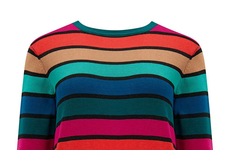
Awamaki Lab Brings Tradition and Fashion Innovation Together
Jordan M — January 19, 2011 — Social Good
References: awamaki.org
Awamaki Lab is a fair-trade weaving project that gives budding fashion designers the opportunity to share their creative vision with the enormously talented native weavers of Ollantaytambo, Peru.
In this collection, you can see the results of the first and most recent Awamaki Lab collaboration with designs by Nieli Vallin. What immediately stands out about them is their unique blend of traditional and urban sensibilities, something that is made possible by the fact that the project bridges the gap between two cultural fashion influences that might otherwise never have had the chance to interact. As a result, each piece is refreshingly unique and explores new and uncharted realms that are well beyond the traditional fare of most contemporary fashion lines.
In this collection, you can see the results of the first and most recent Awamaki Lab collaboration with designs by Nieli Vallin. What immediately stands out about them is their unique blend of traditional and urban sensibilities, something that is made possible by the fact that the project bridges the gap between two cultural fashion influences that might otherwise never have had the chance to interact. As a result, each piece is refreshingly unique and explores new and uncharted realms that are well beyond the traditional fare of most contemporary fashion lines.
Trend Themes
1. Fair-trade Collaborations - Incorporating traditional techniques with contemporary design to create unique products through collaboration opportunities.
2. Sustainable Fashion - Designing eco-friendly fashion by incorporating traditional craftsmanship and using environmentally friendly materials.
3. Cultural Fusion Fashion - Mixing traditional and modern fashion design elements from different cultures to create distinct and innovative fashion products.
Industry Implications
1. Fashion Design - Collaborate with artisanal communities for unique and innovative creations while supporting fair-trade and sustainable practices.
2. Textile Manufacturing - Partner with eco-friendly material suppliers to incorporate sustainable resources, support fair-trade practices, and broaden product offerings.
3. Social Entrepreneurship - Develop fair-trade and sustainable business models that combine traditional knowledge and modern practices for mutually beneficial social and economic impact.
4.2
Score
Popularity
Activity
Freshness























